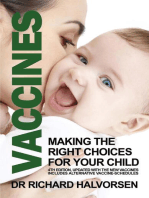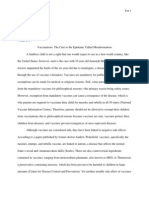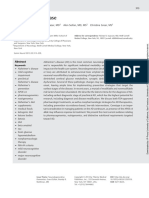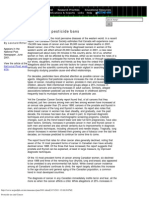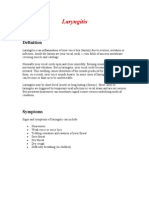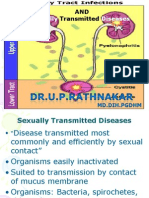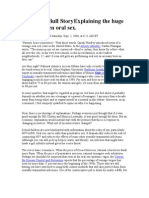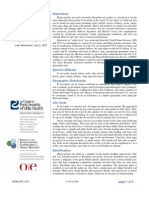0 ratings0% found this document useful (0 votes)
24 viewsRunning Head: Ramandeep Kaur - 134993187
Running Head: Ramandeep Kaur - 134993187
Uploaded by
Sukh Sandhu1) A new study suggests that a germ-free childhood followed by infections later in life can trigger the onset of childhood leukemia.
2) The research finds that acute lymphoblastic leukemia (ALL), the most common type of childhood cancer, is caused by a two-step process involving a pre-birth genetic mutation and subsequent exposure to certain infections in early childhood.
3) The study concludes that ALL may be preventable by priming a child's immune system through normal exposure to infections in the first year of life, reducing the risk of the disease being triggered by later infections.
Copyright:
© All Rights Reserved
Available Formats
Download as DOCX, PDF, TXT or read online from Scribd
Running Head: Ramandeep Kaur - 134993187
Running Head: Ramandeep Kaur - 134993187
Uploaded by
Sukh Sandhu0 ratings0% found this document useful (0 votes)
24 views2 pages1) A new study suggests that a germ-free childhood followed by infections later in life can trigger the onset of childhood leukemia.
2) The research finds that acute lymphoblastic leukemia (ALL), the most common type of childhood cancer, is caused by a two-step process involving a pre-birth genetic mutation and subsequent exposure to certain infections in early childhood.
3) The study concludes that ALL may be preventable by priming a child's immune system through normal exposure to infections in the first year of life, reducing the risk of the disease being triggered by later infections.
Original Description:
Basic Data of Communivato
Original Title
Computer Current Event
Copyright
© © All Rights Reserved
Available Formats
DOCX, PDF, TXT or read online from Scribd
Share this document
Did you find this document useful?
Is this content inappropriate?
1) A new study suggests that a germ-free childhood followed by infections later in life can trigger the onset of childhood leukemia.
2) The research finds that acute lymphoblastic leukemia (ALL), the most common type of childhood cancer, is caused by a two-step process involving a pre-birth genetic mutation and subsequent exposure to certain infections in early childhood.
3) The study concludes that ALL may be preventable by priming a child's immune system through normal exposure to infections in the first year of life, reducing the risk of the disease being triggered by later infections.
Copyright:
© All Rights Reserved
Available Formats
Download as DOCX, PDF, TXT or read online from Scribd
Download as docx, pdf, or txt
0 ratings0% found this document useful (0 votes)
24 views2 pagesRunning Head: Ramandeep Kaur - 134993187
Running Head: Ramandeep Kaur - 134993187
Uploaded by
Sukh Sandhu1) A new study suggests that a germ-free childhood followed by infections later in life can trigger the onset of childhood leukemia.
2) The research finds that acute lymphoblastic leukemia (ALL), the most common type of childhood cancer, is caused by a two-step process involving a pre-birth genetic mutation and subsequent exposure to certain infections in early childhood.
3) The study concludes that ALL may be preventable by priming a child's immune system through normal exposure to infections in the first year of life, reducing the risk of the disease being triggered by later infections.
Copyright:
© All Rights Reserved
Available Formats
Download as DOCX, PDF, TXT or read online from Scribd
Download as docx, pdf, or txt
You are on page 1of 2
Running Head : Ramandeep Kaur – 134993187
A germ – free childhood could trigger leukemia, scientist suggests
Germ free childhoods followed by infections later in life can trigger the onset of childhood
leukemia , a new study suggests. The paper, published in the journal Nature Reviews Cancer,
finds that acute lymphoblastic leukemia, the most common type of childhood cancer is caused
by a two – step process. The first step is a genetic mutation before birth that predisposes a child
to the risk of developing this form of leukemia. The second step is exposure to certain infections
later in childhood, after clean early childhoods that limited exposure to infections. More
specifically, children who grew up in cleaner household during their first year and interacted less
with other children are more likely to develop acute lymphoblastic leukemia , the paper says. The
author institute of Cancer Research Professor Mel Greaves, suggest the cancer could be
preventable. Greaves reviewed more than 30 years of research, including his own, on the
genetics, cell biology, immunology, epidemiology and animal modeling of childhood leukemia
and reached this conclusion. Greaves said he had long wondered “ why or how otherwise healthy
children develop leukemia and whether this cancer is preventable.” This body of research is a
culmination of decades of work, and at last provides a credible explanation for how the major
type of childhood leukemia develops. The research strongly suggest that this cancer has a clear
biological cause, and is triggered by a variety of infections in predisposed children whose immune
systems have not been properly primed. However , other experts warm that more specifics needs
to be confirmed and emphasize that hygiene and safety are still crucial. Acute lymphoblastic
leukemia, known as ALL, is a form of blood cancer that is most often diagnosed in children ages
zero to 4 years old, though older children and adults can also be diagnosed. It develops quickly ,
over days or weeks, building up in the blood and spreads to other parts of the body , including
the lymph nodes, liver and nervous system. The main form of treatment is chemotherapy . Rates
of the disease are increasingly globally. One study estimated there were 53,000 cases worldwide
in 2016. Around 5,960 new cases of ALL are estimated to occur in the United States in 2018, with
1,470 deaths according to the American Cancer Society. Each year , around 810 people are
diagnosed in the UK , according to Cancer Research UK. While a genetic mutation plays a role in
predisposing someone to the disease , just 1% of children born with this mutation go on to
develop the disease , according to the paper. Rates are more common in advanced , affluent
societies , which suggests the second step could be caused by factors relating to modern life.
Previous claims have linked electromagnetic waves and other environmental factors to the
disease , but Greaves dismissed this link in his paper. The body of research “ busts some
persistent myths about the causes of leukemia, such as the damaging but unsubstantiated claims
that the disease is commonly caused by exposure to electro- magnetic waves or pollution.
Greaves instead believes that when a baby is exposed to infections during its first year, its
immune system is strengthened. But later infections , without the initial priming, can trigger
leukemia in those with the genetic mutation. Population studies have found that early exposure
to infection in infancy such as day care attendance and breastfeeding can protect against ALL,
probably by priming the immune system, according to the study. Greaves emphasized that
Running Head : Ramandeep Kaur – 134993187
infection as a cause applies only to ALL. Other type of leukemia , including infant leukemia and
acute myeloid leukemia, probably have different causal mechanisms.
You might also like
- Getting Risk Right: Understanding the Science of Elusive Health RisksFrom EverandGetting Risk Right: Understanding the Science of Elusive Health RisksNo ratings yet
- Vaccines: Making the Right Choice for Your ChildFrom EverandVaccines: Making the Right Choice for Your ChildRating: 5 out of 5 stars5/5 (2)
- Research Paper Vaccines EssayDocument8 pagesResearch Paper Vaccines Essayapi-235445707100% (4)
- The Autoimmune Epidemic: Bodies Gone Haywire in a World Out of Balance--and the Cutting-Edge Science that Promises HopeFrom EverandThe Autoimmune Epidemic: Bodies Gone Haywire in a World Out of Balance--and the Cutting-Edge Science that Promises HopeRating: 3.5 out of 5 stars3.5/5 (37)
- Evidence of Harm: Mercury in Vaccines and the Autism Epidemic: A Medical ControversyFrom EverandEvidence of Harm: Mercury in Vaccines and the Autism Epidemic: A Medical ControversyRating: 4 out of 5 stars4/5 (13)
- Presenation Fibrous Cavernous Tuberculois Teachers VersionDocument49 pagesPresenation Fibrous Cavernous Tuberculois Teachers VersionĆux 天主好 OkereNo ratings yet
- NURSING INFORMATICS Community Health ApplicationsDocument6 pagesNURSING INFORMATICS Community Health ApplicationsThirdy Aquino100% (2)
- LeukemiaDocument7 pagesLeukemiaHilda HallNo ratings yet
- Science Falls Behind As Syphilis Stages Another ComebackDocument5 pagesScience Falls Behind As Syphilis Stages Another ComebackjenniferNo ratings yet
- Top Ten Tips For Success at UniversityDocument2 pagesTop Ten Tips For Success at UniversityFhai EscioNo ratings yet
- PHD Thesis LeukemiaDocument6 pagesPHD Thesis Leukemiaafjryccau100% (2)
- Jurnal 1Document36 pagesJurnal 1Esra SimamoraNo ratings yet
- We Care House FixDocument24 pagesWe Care House FixRifa'atul MahmudahNo ratings yet
- Brain Cancer ScriptDocument2 pagesBrain Cancer Scriptapi-251981413No ratings yet
- Risk Factors For Childhood Leukemia: A Comprehensive Literature ReviewDocument37 pagesRisk Factors For Childhood Leukemia: A Comprehensive Literature Reviewmisbahhari_mdNo ratings yet
- Maternal Infection in Pregnancy and Childhood Leukemia: A Systematic Review and Meta-AnalysisDocument32 pagesMaternal Infection in Pregnancy and Childhood Leukemia: A Systematic Review and Meta-AnalysisAbdurrahman HasanuddinNo ratings yet
- Vaccinated Vs Unvaccinated Homeschooled Kids Can You Guess Who Is HealthierDocument5 pagesVaccinated Vs Unvaccinated Homeschooled Kids Can You Guess Who Is Healthier300rNo ratings yet
- Multiple Sclerosis: Epidemiology GeneticsDocument9 pagesMultiple Sclerosis: Epidemiology GeneticsaureliasartikaNo ratings yet
- Informative Essay - Measles VaccinationsDocument10 pagesInformative Essay - Measles VaccinationsTom BeaulieuNo ratings yet
- Human Vaccines & Immunotherapeutics: News: Two Studies On Optimal Timing For Measles VaccinationDocument4 pagesHuman Vaccines & Immunotherapeutics: News: Two Studies On Optimal Timing For Measles VaccinationTri RachmadijantoNo ratings yet
- Risk Factors CancerDocument19 pagesRisk Factors CancerNathalie Soler BarreraNo ratings yet
- Journal EndocrineDocument5 pagesJournal EndocrineJack BangcoyoNo ratings yet
- Tuberculosis in Infants and ChildrenDocument29 pagesTuberculosis in Infants and ChildrenAnisah TifaniNo ratings yet
- Journal Pone 0258219Document14 pagesJournal Pone 0258219liasarieriwan05No ratings yet
- Philippines: Cheaper Pediatric Cancer Drugs Raise Child Survival RatesDocument4 pagesPhilippines: Cheaper Pediatric Cancer Drugs Raise Child Survival RatesJune DumdumayaNo ratings yet
- 2006 in UsDocument4 pages2006 in UspouralNo ratings yet
- Leprosy in Pregnant Woman PDFDocument3 pagesLeprosy in Pregnant Woman PDFners_ivonNo ratings yet
- New Cancer Treatment? Universal Donor Immune CellsDocument27 pagesNew Cancer Treatment? Universal Donor Immune CellsAnzala KhanNo ratings yet
- Slifirczyk 1Document6 pagesSlifirczyk 1fatimamahmoud.20129No ratings yet
- Nutritional Status As Cancer Diagnosis PredictorDocument13 pagesNutritional Status As Cancer Diagnosis Predictornutri.analuxavierNo ratings yet
- Link Between Male Diabetics With Allergies and Kidney Disease - Nothing To Sneeze atDocument3 pagesLink Between Male Diabetics With Allergies and Kidney Disease - Nothing To Sneeze atJoeben L. DisuNo ratings yet
- Study Links Accelerated Aging To Cancer Risk in Younger Adults - CNNDocument11 pagesStudy Links Accelerated Aging To Cancer Risk in Younger Adults - CNNspapazian1No ratings yet
- Do Vaccinations Cause Autism?Document3 pagesDo Vaccinations Cause Autism?Josh BarberaNo ratings yet
- Clinical and Treatment Considerations For The Pediatric and Aging Patients With Multiple SclerosisDocument14 pagesClinical and Treatment Considerations For The Pediatric and Aging Patients With Multiple Sclerosisbraindoctor37No ratings yet
- HygieneDocument2 pagesHygieneZarul Ikhram Abdul RahimNo ratings yet
- Leukemia Literature ReviewDocument6 pagesLeukemia Literature Reviewafmzmxkayjyoso100% (2)
- Doença de AlzheimerDocument17 pagesDoença de AlzheimerBeatriz PaivaNo ratings yet
- Omicron Cases Are Hitting Highs But New Data Put End in SightDocument3 pagesOmicron Cases Are Hitting Highs But New Data Put End in SightUpendra KumarNo ratings yet
- 2021 The Prenatal Origin of Childhood Leukemia PotentiaDocument15 pages2021 The Prenatal Origin of Childhood Leukemia Potentiadjaoui.sakinaNo ratings yet
- Research Proposal HSC 4730Document31 pagesResearch Proposal HSC 4730api-533785996No ratings yet
- LRitterPesticide Use and CancerDocument2 pagesLRitterPesticide Use and CanceruncleadolphNo ratings yet
- بحث EpidemiologyDocument7 pagesبحث EpidemiologyAhmed Al-obariNo ratings yet
- Sickle Cell Anemia Tracking Down A Mutatio An Interactive LearningDocument6 pagesSickle Cell Anemia Tracking Down A Mutatio An Interactive Learningerikausma29No ratings yet
- LiteraturereviewDocument8 pagesLiteraturereviewapi-311113195No ratings yet
- MG - Project Cancer - Lung CancerDocument6 pagesMG - Project Cancer - Lung CancerMatheo GavrilovNo ratings yet
- Neonatal Sepsis: Progress Towards Improved Outcomes: Andi L. Shane, Barbara J. StollDocument9 pagesNeonatal Sepsis: Progress Towards Improved Outcomes: Andi L. Shane, Barbara J. StollMarco Antonio Mendoza OjedaNo ratings yet
- Lit ReviewDocument5 pagesLit Reviewapi-516851544No ratings yet
- Vaccines: Does herd immunity justify permanent impairment for a few?From EverandVaccines: Does herd immunity justify permanent impairment for a few?No ratings yet
- Part II - The Myth That Vaccination Equals ImmunizationDocument18 pagesPart II - The Myth That Vaccination Equals ImmunizationGary Null100% (4)
- Antimicrobial Therapy and Late Onset SepsisDocument10 pagesAntimicrobial Therapy and Late Onset SepsisKendy LópezNo ratings yet
- 10.1158@1055 9965.epi 19 0044Document13 pages10.1158@1055 9965.epi 19 0044a3081754No ratings yet
- Skin Cancer The Biology of CancerDocument169 pagesSkin Cancer The Biology of CancerFenni Oktoberry100% (4)
- tmp2CC4 TMPDocument9 pagestmp2CC4 TMPFrontiersNo ratings yet
- Sickle Cell DiseaseDocument10 pagesSickle Cell Diseasekarthikavvari2002No ratings yet
- First Case of U.K. Variant of The Coronavirus Detected in Colorado - The Washington PostDocument4 pagesFirst Case of U.K. Variant of The Coronavirus Detected in Colorado - The Washington PostАртём ЗотинNo ratings yet
- Articles Controversy Childrens Vaccination - Dr. Peter McculloughDocument40 pagesArticles Controversy Childrens Vaccination - Dr. Peter McculloughlbnNo ratings yet
- The Biology of Aging: The Current Research AgendaDocument10 pagesThe Biology of Aging: The Current Research Agendagriffone1No ratings yet
- Summary & Study Guide - The Gene Machine: How Genetic Technologies Are Changing the Way We Have Kids - and the Kids We HaveFrom EverandSummary & Study Guide - The Gene Machine: How Genetic Technologies Are Changing the Way We Have Kids - and the Kids We HaveRating: 5 out of 5 stars5/5 (1)
- Understanding Multiple Myeloma: Recent Findings and Laboratory Investigation Updates for Biomedical Scientists: Continuing Professional Development in Pathology For Medical Laboratory ProfessionalsFrom EverandUnderstanding Multiple Myeloma: Recent Findings and Laboratory Investigation Updates for Biomedical Scientists: Continuing Professional Development in Pathology For Medical Laboratory ProfessionalsNo ratings yet
- Food Safety Officers Scheme Syllabus - APPSCDocument4 pagesFood Safety Officers Scheme Syllabus - APPSCDr-Jagadeesh MangamooriNo ratings yet
- LaryngitisDocument5 pagesLaryngitisNader Smadi100% (3)
- 1995-03 Taconic Running Life March 1995Document26 pages1995-03 Taconic Running Life March 1995TaconicArchiveNo ratings yet
- Willoughby-Eastlake COVID Letter 10-10-20Document1 pageWilloughby-Eastlake COVID Letter 10-10-20WKYC.comNo ratings yet
- A1 All ProgramsDocument28 pagesA1 All ProgramsRaniel John Avila SampianoNo ratings yet
- FamilyDocument33 pagesFamilyJitendra BhawalkarNo ratings yet
- Weight-For-Age BOYS: Birth To 5 Years (Percentiles)Document8 pagesWeight-For-Age BOYS: Birth To 5 Years (Percentiles)Theresia FalentinaNo ratings yet
- Administering VaccinesDocument1 pageAdministering VaccinesKate Lucernas MayugaNo ratings yet
- Pharmacotherapy of UTI and STDDocument36 pagesPharmacotherapy of UTI and STDDr.U.P.Rathnakar.MD.DIH.PGDHM100% (1)
- Ohio Department of Health Guidance For Halloween 2020 Amid COVID-19Document2 pagesOhio Department of Health Guidance For Halloween 2020 Amid COVID-19WKYC.comNo ratings yet
- Augmentin SUSPENSION 228 MG/5 ML and 457 MG/5 ML - Mixed Fruit FlavourDocument15 pagesAugmentin SUSPENSION 228 MG/5 ML and 457 MG/5 ML - Mixed Fruit FlavourJohnnedel Delos SantosNo ratings yet
- Sexually Transmitted InfectionsDocument110 pagesSexually Transmitted Infectionstummalapalli venkateswara raoNo ratings yet
- Pathology Clinic Nasopharyngeal CarcinomaDocument2 pagesPathology Clinic Nasopharyngeal CarcinomaTukang Gali KuburNo ratings yet
- Blood: Symptoms of Dengue FeverDocument7 pagesBlood: Symptoms of Dengue FeverPrincess Viluan PazNo ratings yet
- Investigation of An EpidemicDocument18 pagesInvestigation of An Epidemicm.msilasNo ratings yet
- Glasgow Coma ScaleDocument2 pagesGlasgow Coma Scalemypinklagoon8411No ratings yet
- Indications of Weak Saturn As Per AstrologyDocument2 pagesIndications of Weak Saturn As Per AstrologyVedicGraceNo ratings yet
- Maxillofacial - Infection - Dari KikiDrDocument20 pagesMaxillofacial - Infection - Dari KikiDrmashitadyahNo ratings yet
- New India Family Floater Mediclaim Proposal FormDocument5 pagesNew India Family Floater Mediclaim Proposal FormspibluNo ratings yet
- Cock-And-Bull Story Explaining The Huge Rise in Teen Oral SexDocument2 pagesCock-And-Bull Story Explaining The Huge Rise in Teen Oral SexSkyvalley81No ratings yet
- Tong Lee To 189Document99 pagesTong Lee To 189calv23100% (1)
- Non Enteric GIT PathogensDocument16 pagesNon Enteric GIT PathogensMaria Cecilia FloresNo ratings yet
- Boophilus MicroplusDocument3 pagesBoophilus MicroplusCarlos RezendeNo ratings yet
- IBT Reflection-on-Globalization - ACC-324ADocument2 pagesIBT Reflection-on-Globalization - ACC-324AHella Mae RambunayNo ratings yet
- 1110 - Truth Is Stranger Than Fiction Based On FactDocument18 pages1110 - Truth Is Stranger Than Fiction Based On FactAgada PeterNo ratings yet
- Case Study: PharyngitisDocument3 pagesCase Study: PharyngitisRestian Rony SaragiNo ratings yet
- Process Considerations On The Application of High Pressure Treatment at Elevated Temperature Levels For Food PreservationDocument102 pagesProcess Considerations On The Application of High Pressure Treatment at Elevated Temperature Levels For Food PreservationWilliam Rolando Miranda ZamoraNo ratings yet
- Mental HealthDocument66 pagesMental HealthKarunya Vk100% (2)

